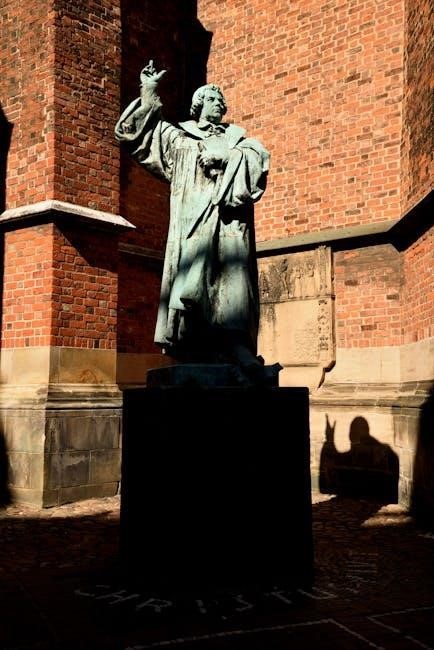Martin Luther’s 95 Theses‚ written in 1517‚ challenged Catholic Church practices. Available as a PDF‚ this document sparked the Protestant Reformation‚ shaping modern Christianity profoundly.

1.1 Overview of the Historical Context
In October 1517‚ Martin Luther published his 95 Theses‚ challenging Catholic Church practices like indulgence sales. This act‚ on the eve of All Saints’ Day‚ sparked the Protestant Reformation. The theses‚ widely circulated in PDF and other formats‚ criticized Church doctrine and authority‚ resonating across Europe. Luther’s bold move followed growing discontent with papal power and theological disputes‚ setting the stage for a religious and societal upheaval that reshaped Christianity and European history.
1.2 Significance of the 95 Theses in Christian History
Luther’s 95 Theses hold immense significance as a catalyst for the Protestant Reformation. By questioning indulgences and papal authority‚ they challenged Catholic doctrine‚ leading to the emergence of Protestant denominations. Available in PDF‚ the document remains a cornerstone of Christian history‚ symbolizing the struggle for theological reform. Its impact endures‚ influencing contemporary Christian thought and ecumenical discussions‚ ensuring its relevance centuries after its initial publication in 1517.

The Historical Background Leading to the 95 Theses
In early 16th-century Europe‚ the Catholic Church faced internal corruption and external pressures. Its lucrative sale of indulgences and centralized authority sparked widespread discontent‚ setting the stage for Luther’s bold challenge.
2.1 The Catholic Church’s Practices in the Early 16th Century
In the early 16th century‚ the Catholic Church engaged in practices that drew significant criticism. The sale of indulgences was particularly controversial‚ as they were marketed as a means to reduce punishment for sins. This practice‚ along with the Church’s immense political power and wealth‚ created widespread dissatisfaction among the faithful. Such practices were seen as contrary to biblical teachings‚ fostering an environment of corruption and abuse of authority within the Church hierarchy. This discontent laid the groundwork for the challenges posed by reformers like Martin Luther.
2.2 Martin Luther’s Growing Concerns with Church Doctrine
Martin Luther‚ a devout monk and scholar‚ developed deep concerns about Church doctrine in the early 16th century. His theological studies revealed discrepancies between biblical teachings and Church practices‚ particularly the sale of indulgences. Luther believed true repentance came from faith and divine grace‚ not monetary transactions. He also questioned the authority of the Pope‚ advocating for individual interpretation of Scripture. These concerns led him to challenge Church corruption‚ ultimately inspiring the 95 Theses and catalyzing the Protestant Reformation.

The Key Content and Arguments of the 95 Theses
Luther’s 95 Theses critiqued indulgences and papal authority‚ emphasizing faith over monetary transactions. The PDF highlights his theological arguments‚ challenging Church practices and promoting biblical truth.
3.1 Critique of Indulgences and Their Sale
Martin Luther’s 95 Theses primarily attacked the Catholic Church’s practice of selling indulgences. He argued that forgiveness could not be bought and that true repentance came from faith‚ not monetary transactions. Luther criticized the Church for exploiting people’s fear of purgatory‚ emphasizing that salvation was a gift from God‚ not a commodity. His critique challenged the Church’s authority and sparked widespread debate. The PDF version of the 95 Theses provides a detailed examination of Luther’s arguments against indulgences‚ highlighting their theological and historical significance.
3.2 Theological Arguments Against Papal Authority
Thesis 62 challenges the Pope’s authority to grant indulgences‚ asserting that Christ‚ not the Pope‚ is the true mediator of salvation. Luther argued that the Pope’s decrees should align with Scripture‚ not personal power. He questioned the Church’s hierarchical structure‚ advocating for individual faith and direct access to God. The PDF version of the 95 Theses provides a detailed examination of Luther’s arguments against papal authority‚ highlighting their theological and historical significance in the context of the Protestant Reformation.
The Immediate Impact of the 95 Theses
The 95 Theses spread rapidly across Europe‚ sparking debates and challenging Catholic authority. Their publication marked the beginning of a theological and social transformation in Christianity.
4.1 The Spread of the Theses Across Europe
The 95 Theses spread rapidly across Europe‚ facilitated by the printing press. Within weeks‚ copies reached distant regions‚ sparking intense debates. By 1518‚ translations appeared in multiple languages‚ ensuring widespread dissemination. The document resonated with those disillusioned by Catholic practices‚ fueling reform movements. Its influence extended beyond Germany‚ impacting France‚ Italy‚ and England. The Theses’ popularity highlighted the power of printed media in spreading ideas‚ marking a pivotal moment in the Protestant Reformation’s early stages.
4.2 Initial Reactions from the Catholic Church
The Catholic Church responded swiftly to Luther’s 95 Theses‚ viewing them as a direct challenge to its authority. Church officials‚ including Pope Leo X‚ condemned the document‚ demanding Luther recant his views. The Theses were labeled heretical‚ and efforts were made to suppress their spread. Despite this‚ the ideas gained traction‚ leading to further theological debates. The Church’s reaction highlighted the growing divide between reformers and traditionalists‚ setting the stage for the Protestant Reformation’s escalation.

The Role of the 95 Theses in the Protestant Reformation

The 95 Theses ignited the Protestant Reformation by challenging Catholic Church practices. They became a catalyst for theological reform‚ inspiring widespread debate and the rise of Protestant denominations.
5.1 The Spark That Ignited the Reformation Movement
Martin Luther’s 95 Theses acted as the catalyst for the Protestant Reformation. By challenging Catholic doctrines‚ particularly indulgences‚ Luther’s ideas spread rapidly across Europe. His bold critique of church practices resonated with many‚ sparking widespread theological debates and inspiring reform. The theses‚ now accessible as a PDF‚ remain a foundational document‚ illustrating how a single act of defiance could ignite a movement that transformed Christianity forever.

5.2 The Emergence of Protestant Denominations
The 95 Theses laid the groundwork for the rise of Protestant denominations. Luther’s critique of Catholic practices inspired diverse reform movements. The PDF version of the document highlights his theological arguments‚ which influenced leaders like Calvin and Zwingli. Over time‚ this led to the establishment of Lutheranism‚ Calvinism‚ and other Protestant churches. The legacy of the 95 Theses is evident in the rich tapestry of Protestant traditions that continue to shape Christianity today.

The Legacy of the 95 Theses in Modern Christianity
The 95 Theses remain influential‚ shaping modern Christian thought and ecumenical dialogue. Their critique of indulgences and emphasis on grace continue to inspire theological reflection and reform.
6.1 Influence on Contemporary Christian Thought
Martin Luther’s 95 Theses significantly influence modern Christian theology by emphasizing justification by faith and challenging institutional authority. This principle resonates in today’s ecumenical discussions‚ promoting unity and reform.
6.2 Continued Relevance in Ecumenical Discussions
The 95 Theses remain central to ecumenical dialogues‚ fostering unity among Christian denominations. Their principles‚ like justification by faith‚ continue to inspire discussions on church reform and theological alignment. The widespread availability of the 95 Theses in PDF format ensures accessibility‚ enabling modern scholars and believers to engage with Luther’s ideas. This historical document bridges past and present‚ offering timeless insights that enrich contemporary religious discourse and promote understanding across diverse Christian traditions.
Accessing and Interpreting the 95 Theses in PDF Format
The 95 Theses are widely available in PDF format‚ enabling easy access for study and reflection. Understanding their historical and theological significance requires careful interpretation and context.
7.1 Sources for Downloading the 95 Theses PDF
The 95 Theses by Martin Luther are readily available in PDF format from various academic and religious websites. Platforms like Google Scholar‚ JSTOR‚ and university repositories offer free downloads. Religious institutions and historical archives also provide access to the document. Additionally‚ websites such as Project Gutenberg and the Internet Archive host the PDF‚ ensuring wide accessibility for scholarly and personal use. These sources are reliable and maintain the integrity of Luther’s original work‚ making it easy to study and reference.
7.2 Guidance on Understanding the Historical Document
To fully grasp Luther’s 95 Theses‚ readers should first understand the historical context of the early 16th-century Catholic Church. The document critiques indulgences and challenges papal authority‚ sparking the Protestant Reformation. Approach the PDF with knowledge of theological terms and the social dynamics of the time. Pay attention to Luther’s arguments about faith‚ grace‚ and scripture’s primacy. For deeper understanding‚ pair the PDF with historical commentaries or scholarly analyses. This dual approach enriches comprehension of its significance in Christian history and its enduring influence.
Luther’s 95 Theses‚ now widely available as a PDF‚ remain a pivotal document in Christian history‚ challenging traditions and emphasizing scripture and faith.
8.1 The Enduring Significance of the 95 Theses

The 95 Theses‚ now widely accessible as a PDF‚ remain a cornerstone of Christian history. They sparked the Protestant Reformation‚ challenging indulgences and emphasizing faith over works. Their critique of papal authority and call for theological reform continue to influence modern religious discourse. The document’s enduring relevance lies in its balance of critique and theological depth‚ making it a vital resource for understanding the Reformation’s origins and its lasting impact on Christianity today.
